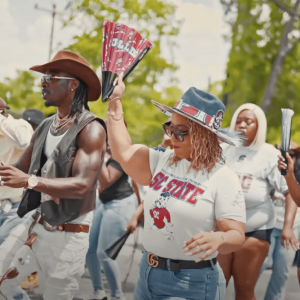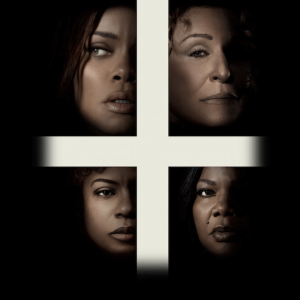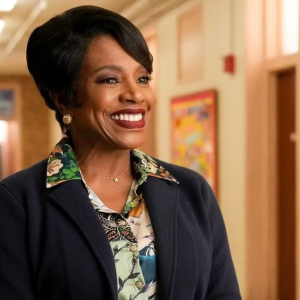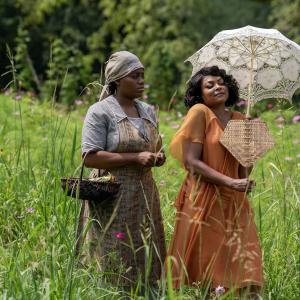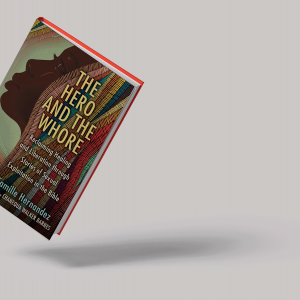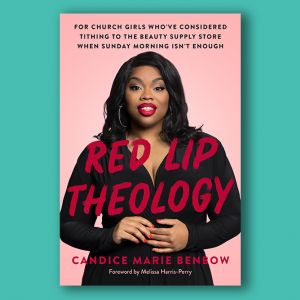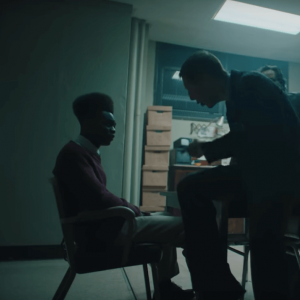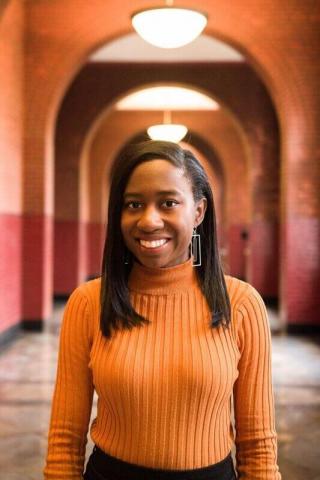
Deirdre Jonese Austin is a minister, writer, scholar, and womanist whose work focuses on religion, race, gender, and sexuality. You can learn more about her and also read her blog posts at DeirdreJoneseAustin.com.
Posts By This Author
From the Early Church to ‘Boots on the Ground,’ Dance Is Worship
I didn’t expect church to be the place where I learned 803Fresh’s “Boots on the Ground,” the latest line dance taking the nation by storm. The song, which currently has more than 14 million views on YouTube and is known for the refrain, “Where them fans at,” has been danced to by folks like Shaquille O'Neal, Ciara, Kamala Harris, Tina Knowles, and Michelle Obama. And it’s been performed everywhere, from trail rides to graduations, news broadcasts to talk shows. But when people started performing the line dance in church, not everyone was pleased.
“Some of these so call [sic] churches is night 🌙 clubs,” wrote one Facebook user in response to a viral video of a “Boots on the Ground” line dance performance at a small church. “Put them boots on the PASTOR and scoot him out of the church,” another wrote.
A Love Letter to Black Women Preachers
Melanie R. Hill’s new book delights in “womanist sermonic practice.”
MELANIE R. HILL’S Colored Women Sittin’ on High is a love letter to Black women preachers. “From the cradle, I was surrounded by Black women preachers,” she writes. “Black women who prayed, Black women who preached and prayed, Black women who laid their hands on me and prophesied a destiny full of hope and fulfilled dreams.” For Hill, womanist sermonic practice isn’t confined to just the pulpit. These preachers include the aunts and grandmothers, artists and activists who have “created a healing and restorative space beyond the four walls of the church for the surrounding community and region.”
Hill, an assistant professor of both global racial justice and American literature at Rutgers, utilizes Alice Walker’s definition of womanism as laid out in In Search of Our Mothers’ Gardens, focusing closely on how womanists are “committed to survival and wholeness of entire people.” She addresses the ways that womanism and Black women’s literature have informed the work of Black women preachers, attending to their voices in what she terms “womanist sermonic practice.” Through this practice, Black women preachers demonstrate how to love ourselves and the Black bodies that we inhabit and how to love others and fight against systems of oppression.
We Need a God Who Is ‘Furious’
D. Danyelle Thomas’ ‘The Day God Saw Me as Black’ celebrates the God-given goodness of Black women and replaces oppressive theology with liberation.
“I’LL BREAK IT down so that it may forever remain broken: Blackness is holy in and of itself,” writes D. Danyelle Thomas in her new book, The Day God Saw Me as Black: The Journey to Liberated Faith.The founder of the digital faith community Unfit Christian reflects on the ways that white evangelical theology has shaped the Black Church. She lovingly calls in the Black Church to liberate our mindsets around race, gender, sex, and sexuality.
Like Candice Marie Benbow’s Red Lip Theology (2022) and Lyvonne Briggs’ Sensual Faith (2023), The Day God Saw Me as Black reflects Thomas’ identity as a Black millennial womanist. Her experience growing up as a fat, Southern, Black Christian woman is central throughout.
Thomas expresses her love for the Black Church, even as she names all the ways it has been colonized and shaped by white evangelicalism — a Christian tradition “plagued by racism, sexism, classism, trans- and homo-antagonism, and systemic oppression.” These are the evangelical values, Thomas explains, that insisted “God is good all the time,” even amid violence and oppression, from the transatlantic slave trade to South African apartheid to the Tulsa Race Massacre.
‘The Deliverance’ Aims to Exorcize the Demon of Racism
Loosely inspired by the experiences of Latoya Ammons in Gary, Ind., Netflix’s The Deliverance follows single mother Ebony Jackson as she battles demons, her past, and systems entrenched with racism and sexism — all to save her family.
‘Abbott Elementary’ on Loving a Church That Doesn’t Always Love You Back
In ABC’s workplace comedy Abbott Elementary, Barbara Howard (Sheryl Lee Ralph) provides one example of what it looks like for Black Christian women to live out their faith in their everyday lives.
‘The Color Purple’ Can Survive Alice Walker’s Prejudice
In her support of Icke and Rowling, Walker seems to have lost sight of her own claims about God and humanity that are revealed in The Color Purple and other works.
‘The Hero and the Whore’ Offers Hope for Redemption
Camille Hernandez reinterprets biblical characters through the lens of sexual exploitation.
HAVE YOU EVER heard a sermon on Dinah? Have you read many commentaries on Hegai? In The Hero and the Whore: Reclaiming Healing and Liberation Through Stories of Sexual Exploitation in the Bible, Camille Hernandez, a trauma-informed educator and minister, interprets the narrative of these lesser-known biblical characters. She also reinterprets the stories of well-known figures — such as Eve, Rahab, and Potiphar’s wife — through the lens of sexual exploitation. For too long, stories of women in the Bible have been interpreted in religious cultures rooted in racism, sexism, homophobia, and transphobia. As a result, many Christians have stripped these characters of their agency and voice, demonized them, and sometimes ignored them altogether.
Hernandez provides language to reclaim our own narratives and process our own trauma. She encourages imagining a future where all people are safe and protected from sexual violence and other forms of oppression — both in the church and in society at large.
Pleasure Is a Sacred Gift
Lyvonne Briggs' ‘Sensual Faith’ brings our bodies into the light of God.
HAS RELIGION ALIENATED you from your body, demonized your sexuality, or caused you to see your body as a source of shame? If so, it’s time to come home. In Sensual Faith: The Art of Coming Home to Your Body, body- and sex-positive pastor Lyvonne Briggs invites Black Christian women and femmes to reconnect with and feel at home in their bodies, sexuality, and sensuality: “You see, Sis, home is not an address; home is where you feel safe.” Finding home in our bodies is important because, all too often, Christian spaces have deemed our bodies “temptations” and our bodily processes “nasty.” And historically, American society has tried to control Black women’s bodies and sexualities, denying our humanity and womanhood through slavery, sterilization policies, and degrading stereotypes such as the asexual Mammy and the hypersexual Jezebel. So, the type of bodily reclamation Briggs writes of is an act of personal and societal justice.
Similar to theologian Candice Marie Benbow’s Red Lip Theology (2022), Sensual Faith is a womanist work that centers the experiences of Black women of faith. “Womanism” is the term coined by writer Alice Walker in the early 1980s to honor the experiences of Black women, who were often overlooked and excluded by the feminist movement. By utilizing a womanist interpretation of the Bible, Briggs challenges harmful religious messages around women’s bodies: “Womanism says: Your sexuality is a sacred gift. Your body is holy. Just as it is. Pleasure is your birthright.”
‘Red Lip Theology’ Lets Black Christian Women Be Ourselves
In her new book, theologian Candice Marie Benbow takes readers on a journey through some pivotal and transformational moments in her life, highlighting the conversations she had with her mother, the theology informing her, and the sources — such as literature and hip-hop — that have shaped who she is. Red Lip Theology: For Church Girls Who’ve Considered Tithing to the Beauty Supply Store When Sunday Morning Isn’t Enough is an invitation to reflect on the moments, the people, and the religious institutions that have contributed to making us who we are.
How One Worship Leader Made Racial Justice Protests About Christian Persecution
Sean Feucht's worship events run counter to the revolutionary spirit of Jesus.

Sean Feucht performing in Seattle, Sept. 10, 2020. Screengrab from YouTube.
“God is spirit, and those who worship him must worship in spirit and truth,” Jesus tells the Samaritan woman at the well in John 4:24. But when our worship is based in a denial of truth and runs counter to the nature and character of God is it truly worship? This is a question I have been pondering in considering a series of worship events organized by Sean Feucht, a vocal supporter of President Donald Trump, worship leader, and politician.
Who Remains for the Families of the Slain?
This is what slow death looks like for the families of victims of police brutality.
The Long Road to Decriminalizing Blackness
'When They See Us' and the Central Park Five
I watched Ava DuVernay’s Netflix series When They See Us and found myself angered by the people and systems that had a role in the incarceration of five innocent boys. The Central Park Five, Raymond Santana, Kevin Richardson, Antron McCray, Yusef Saalam, and Korey Wise, were wrongfully convicted and later exonerated of a variety of charges related to the rape and assault of a white female jogger in 1989. While the series itself honors the stories of the Central Park Five, in choosing to title the series When They See Us, DuVernay invites us into a broader conversation on the criminalization and mass incarceration of young boys and girls of color, and challenges us to define our own role within this system.
